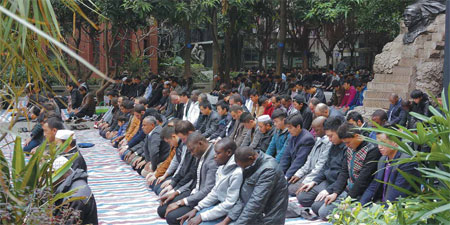Answering the call to prayer
Updated: 2014-04-04 07:10
By Zhao Xu (China Daily USA)
|
|||||||||
African Muslims find gathering spot to worship in Guangzhou, Zhao Xu reports.
For Chinese residents living near narrow, tree-lined Jinrong Street in the center of Guangzhou, Guangdong province, Friday is the day when they are treated to a spectacle - a weekly event they can almost set their clocks by.
Everything begins at noon. As if on cue, a group of men appear - some wearing flowing, ankle-length cotton gowns in a variety of hues. As much as their clothes, the men's dark skin tones immediately distinguish them from the locals. They linger briefly near the opening of a side street that leads to a byroad, which in turn leads to their meeting place.
As the clock ticks toward 1 pm, a growing number of people arrive, with some appearing to be in a great hurry, jumping out of taxis before ducking directly into the stone-covered, well-trodden byroad.
At the end of a 30-meter footpath, sandwiched between a number of slightly dilapidated six- and seven-story residential buildings that rise on both sides, is a humble gate. It's so understated that it would be easy to miss were it not for a line of gilded words carved in stone above the Moorish style arch that read "Xiao Dong-ying Mosque" in Chinese and Arabic.
"For the city's African Muslims, especially those from West Africa, this is where they come for Jumu'ah, the prayer meetings held every Friday," said Bai Lin, the imam of the mosque who regularly leads the prayers and whose life has been intertwined with the 530-year-old building for the past 11 years.
"I came to Guangzhou in 2003, after graduating from Beijing's China Islamic Institute, two years before the official reopening of the mosque in 2005 - it had been closed to the public since 1949," he said. "It didn't take long for this ancient house of prayer to win a place in the hearts of modern-day believers. Since mid-2006, the worshipping masses have regularly overflowed onto the streets and the nearby residential square."
Finding a foothold

The worshippers have returned every Friday since to kneel and pray, and the weekly gatherings are now a popular fixture of the local scene.
"The city's current African Muslim population began to arrive in the early 2000s. They came mainly from West and North Africa to conduct business during China's opening-up and reform drive. They were following in the footsteps of their Muslim brothers from the Middle East and Southeast Asia," said Wang Wenjie, a long-serving imam who is president of the Guangzhou Islamic Association.
"Their numbers have almost doubled during the past five years. Today, of the city's estimated 55,000 foreign Muslim residents, one-third come from Africa," said the 50-year-old. "This effectively makes Guangzhou the Chinese city with the largest African Muslim population."
Inside Xiaodongying Mosque, the worshippers from Africa greatly outnumber their Chinese fellow Muslims. Outside of it, they've found a foothold nearby in the bustling, mildly chaotic Xiaobei and Xiatangxi roads, lined with stores and halal restaurants.
Punctuated by shop signs in swirling Arabic characters rendered in a seemingly unbroken flow, the area is in constant flux: In the early days, the newcomers could often be seen pulling heavy suitcases and waiting anxiously for the traffic lights to change. Eventually, many of them settled down, rented rooms from the locals and brought in members of their extended families in Africa. Although a solid presence nowadays, many of these enterprising traders started from modest bases, such as hotel rooms.
Feng Yun, a Chinese Muslim who owns a halal restaurant on the second floor of the Baixun Hostel on Xiatangxi Road, has befriended many of the guests who frequent his small business.
"Of the 200 or so people living in this building, 90 percent are from Africa and most of them are Muslims. Basically, they trade in everything they would sell in Africa, from clothing to closets. Some send containers home, others just send giant parcels," said the 33-year-old, who spent a decade living in Egypt before returning to China in October. "Cairo is known as 'The City of a Thousand Minarets', which means there is always a mosque within a five-minute walk. Here, we only have four mosques, but the Muslims still feel very much connected with Allah, especially in this part of town," he said.
The prayer corner
Feng pointed to a corner of the restaurant hidden behind a curtain, the floor covered by yellow carpets bedecked with minarets and laid from east to west. "Five times a day, at set hours, Muslims are required by the Quran to kneel facing west toward Mecca and pray. That's what that corner is for," he said.
His customers appreciate the gesture, especially newcomers such as Mamadou Sillah, a 32-year-old Gambian who arrived in Guangzhou last year. "The prayer corner is a feature of almost all the halal restaurants in the vicinity. For a foreign Muslim new to the city, this is very reassuring," said the 32-year-old, who works for a trading company founded by a compatriot.
Sillah is a devoted attendee of Friday prayers at Xiaodongying Mosque. "Before we begin the prayers, the imam reads a little Arabic from the Quran, and then explains it in Chinese," he said. "I don't understand Chinese, but it isn't a big deal because I can roughly guess what he's talking about - same message, different language."
Bai, the imam at Xiaodongying Mosque, is fully aware of the emotional distance that can be created by a foreign language and has sought to lessen it. "The power of every single word in the Quran resides as much in its spoken form - the intonation and intrinsic musicality - as the written one," he said. "I've always tried to intersperse my preaching, which is in Chinese, with recitals from the holy book, to guide the ears and hearts of all believers."
The 34-year-old was grateful to the Africans who attend the mosque. "In the early days of my imamship, I was able to draw confidence from the respect and trust they placed in me," he said.
"Unlike some Muslims from Middle Eastern countries, who tend to see themselves or their way of worshipping as the paradigm for all followers of Islam, African Muslims are generally very humble and down-to-earth," he said. "Despite their occasional stubbornness, they are the most genuine people I've ever met."
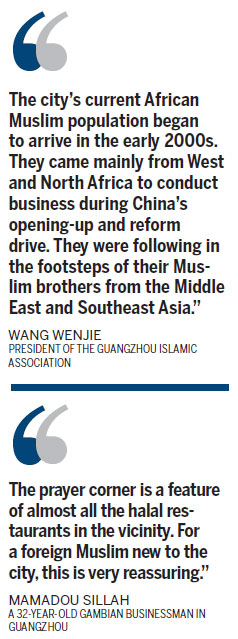
Over the years, Bai has not only offered help to Africans who have lost their money or passports, but also presided over their wedding ceremonies - sometimes to Chinese women who have converted to Islam - and has played the peacemaker during periods of family tension. Occasionally, he has also intervened when serious issues arose.
"Some of the Africans I know don't encourage their wives to go to the hospital for regular checkups during pregnancy and would prefer to have the babies delivered at home. They are also extremely reluctant to let their wives undergo cesarean sections, even when not doing so would expose the women to considerable risk. I have to say this has more to do with the conventional beliefs of their African societies back home than with the teachings of Islam," he said. "But in cases such as these, I do my best to mediate, but of course with due sensitivity."
However, there have also been times when Bai and his nine fellow imams in Guangzhou have felt inadequate, usually when the issue concerns one of the most sacred and subtle aspects of Muslim life: burial of the dead.
"Muslims believe in inhumation - cremation is never an option," said Wang Guanxue, who has been an imam in Guangzhou for 17 years. "The municipal government arranged for the Chinese Muslim population to perform burials in the city's Muslim cemetery. But because of a severe shortage of land, foreign Muslims who die in Guangzhou don't enjoy the same rights: Their remains have to be flown to their home country for burial."
"The procedure is smooth, but one needs to pay around 20,000 yuan ($3,220) for a coffin and then another 80,000 for the flight. Keeping in mind that most of the African Muslims in Guangzhou are engaged in small-scale trade that yields only a moderate profit, the sum sounds crazy. However, the people I know have always managed to pay in the end," he said.
Another contentious issue for Muslims is the education of their children, according to the 51-year-old imam. "A Muslim naturally wants his or her children to be educated in the Islamic tradition. As far as I know, Guangzhou does have a couple of Islamic schools for children aged between 5 and 16, operated by Arab Muslims. But due to a number of reasons, ranging from cost to cultural differences, African Muslims - apart from those from the Arabic countries of North Africa - rarely send their children to these schools," he said. "Behind the growing number of African Muslims in the city, there is an even larger number of children left back home in Africa. The separation must be painful for all concerned."
Growing competition
According to Wang Caixia, who operates a small logistics company on Xiatangxi Road, just around the corner from Baixun Hostel, the Muslim traders have not been helped by the economic situation in the wake of the 2008 financial crisis, the continued appreciation of the yuan and the growing competition among themselves.
"Have you noticed the line of minivans parked outside along the street? They are responsible for sending the African traders' purchases to our storerooms and ultimately to the port," she said. "If you take the hotel as the central point, within a radius of 5 kilometers, there are around 30 logistics companies, including ours. Collectively, our businesses offer telltale indications of the economic health of the Africans."
Wang said the best days were those directly before 2008, when the goods her company transported filled nearly 100 containers every month. Today, that number has dropped to somewhere between 10 and 20, depending on the month of the year.
"With the onslaught of the financial tsunami, things took an abrupt turn and went into what seemed back then like free-fall. But it touched the bottom by the end of 2009, and from that point, things have consistently improved, although I'm still not too sure about the chances of a full recovery," she said. "The fact that most of the traders are dealing in the middle-to-low end of the market has made them extremely vulnerable to the fickleness of the economy."
Amadou Ndiaye, a Malian Muslim whose transformation from wide-eyed foreign student to businessman and old China hand took nearly 30 years, said the pinch caused by the rising value of the Chinese currency has been palpable. "We have to sell the goods we buy in Guangzhou at a much higher price to people in Africa, which means goods that used to take one week to sell now routinely take two or three months," he said.
But the traders continue to arrive, undeterred by any uncertainty that might appear on the horizon. This, according to Ndiaye, has as much to do with religion and family ties as entrepreneurship.
"When I first came to Guangzhou in 1985, I was a student at the city's South China Agricultural University," recalled the 54-year-old who spends 75 percent of his time in Guangzhou running his business. "Only one mosque was open at the time and the few foreign Muslim students - mostly from Mali - would sometimes join the 200 or so Chinese Muslims for Friday prayers. But those occasions were quite rare: Most of the time, we just prayed at the dorm, led by a fellow Malian student who was an imam back in Africa."
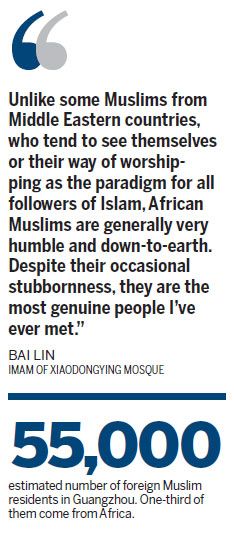
These days, the mosque to which he referred, Huaisheng, or Holy Remembrance Mosque, receives more than 2,000 worshippers on Fridays. However, that number is dwarfed by attendances at Xianxian, or Bygone Sage Mosque, which is reputed to attract nearly 10,000 people to the weekly Jumu'ah. Both mosques are located in the old town in the city's heart and will be forever associated with one man - Saad bin Abi Waqqas, an important companion of the Prophet Muhammad. Some say he was the prophet's maternal uncle, and the first Islamic preacher in China.
He is reputed to have arrived in China in around AD 620 and it was at his behest that the Huaisheng Mosque was constructed in around AD 625 during the Tang Dynasty (AD 618-907), making it the oldest mosque in the country. Historians differ over both the date of his death and his final resting place, but according to a theory espoused by the bulk of Chinese scholars, he passed away in around AD 630 and was buried in Guangzhou. Xianxian Mosque was later built close to the grave.
An international metropolis
On days other than Friday, Xianxian, covering 28,000 square meters, is a garden cemetery with a solitary beauty, enveloped perennially in the lush greenery of the subtropical city. The slab-covered trail leading to what is believed to be Waqqas' burial chamber is regularly washed clean by the rain and is trodden by pious Muslims year-round.
"Trade brought the Muslims to Guangzhou 1,400 years ago, in very much the same way it does today," said Wang Wenjie. "Back then, they introduced Islam to the coastal city and partly through that, the entire country. Today, the influx of foreign Muslims has made Guangzhou an international metropolis and a magnet for Chinese Muslims who have opened more than 1,900 halal noodle restaurants in the city."
Mohammed Nagi, a Libyan Muslim who has lived in Guangzhou for eight years, said his attachment to the city began after his first visit to the Huaisheng Mosque.
"Someone told me that the mosque once sat right on the banks of the Pearl River, which runs through Guangzhou and the minaret served as a beacon for approaching ships. The water has since receded to about 2.4 miles (3,860 meters) away," he said. "Time can change a lot, but history lives on in the present. Every call to prayer rising from the top of the minaret echoes down the millennium."
Contact the writer at zhaoxu@chinadaily.com.cn
Peng Yining, Yang Yang, Li Wenfang and Zhang Yu'an contributed to this story.
|
Chinese and African Muslims pray at the weekly Jumu'ah at Xiaodongying Mosque, one of four mosques in Guangzhou. There are now an estimated 55,000 foreign Muslims in the city, and one-third of them come from Africa. Photos by Zou Zhongpin / China Daily |
|
From left to right: The entrance of Xiaodongying Mosque. African traders look for accommodation at Xiatangxi Road. Huaisheng Mosque in downtown Guangzhou is believed to be the oldest mosque in China, having been built around AD 625 during the Tang Dynasty (AD 618-907). The stores along Xiatangxi Road are frequented by African traders. Xianxian Mosque is a garden cemetery, built close to the reputed tomb of Saad bin Abi Waqqas, an important companion of the Prophet Muhammad. Some historians claim Waqqas was the first Islamic preacher in China. |
(China Daily USA 04/04/2014 page7)

 Chinese drama to stage in Silicon Valley
Chinese drama to stage in Silicon Valley
 World's unusual graveyards
World's unusual graveyards
 China's first 'sea airship' to be put into commercial use
China's first 'sea airship' to be put into commercial use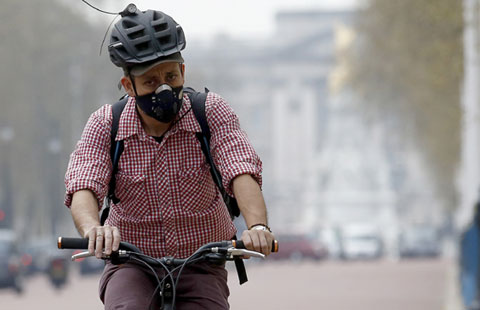
 A 'perfect storm' of smog in UK prompts health alert
A 'perfect storm' of smog in UK prompts health alert
 Koala selfie
Koala selfie
 Bodybuilders prepare backstage before competition
Bodybuilders prepare backstage before competition
 Tanks tackle wildfires in NE China
Tanks tackle wildfires in NE China
 10 monks pass highest Tibetan Buddhism exam
10 monks pass highest Tibetan Buddhism exam
Most Viewed
Editor's Picks
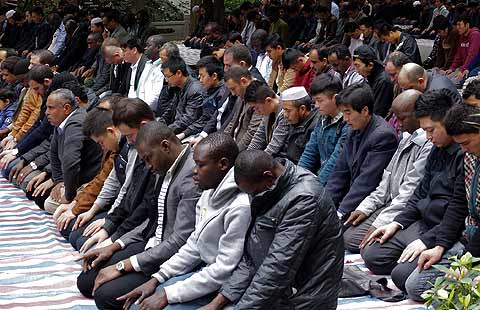
|

|

|

|

|

|
Today's Top News
US soldier kills 3 in army base shooting
China urges rescue of held tourist
British FM welcomes ratification of global ATT
China tops clean energy market
Manhattan fights NJ for China tourists
Satellite to monitor environment, disasters in Europe
Officials urged to focus on food and drug safety
Study zooms in on health of youth
US Weekly

|

|
